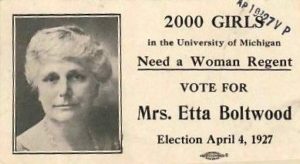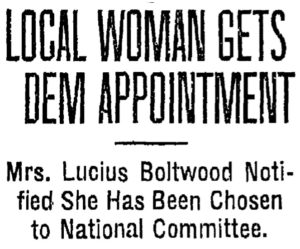About Etta Comstock Boltwood (1869–1948)

1927 political advertisement for Etta Comstock Boltwood.
In 1919, Etta Comstock Boltwood ran an unsuccessful campaign as the Democratic nominee for a seat on the University of Michigan Board of Regents. She received over 6,000 votes, a respectable turnout but not enough to win the election. She tried for the same office again in 1927, but was unsuccessful once more.
Her aspirations for political office did not turn out as she would have liked. At the time of her first run Boltwood had already established herself as a skillful leader and organizer through her work with the women’s suffrage movement and at the head of several influential women’s clubs in Grand Rapids.
In 1907, she served as president of the Woman’s Auxiliary of the Board of Missions of the Diocese of Western Michigan. In 1910, she was appointed to the Grand Rapids Y.W.C.A. Board of Directors. From 1914 to 1915, she served as president of the influential Grand Rapids Ladies’ Literary Club. In 1915, she was also elected as a council member for the Grand Rapids Association of the Blind and appointed as chair of a new woman’s peace party in Grand Rapids. And in 1917, she was elected regent of the Sophie de Marsac Campau Chapter of the Daughters of the American Revolution.

Grand Rapids Press, July 6, 1920.
A year after her failed 1919 campaign for the University of Michigan Board of Regents, Boltwood was honored with an appointment from the Democratic Party to serve on its national committee. A reporter announcing Boltwood’s appointment observed that she was among the first women in Michigan history to run for state office. The year of Boltwood’s historic campaign—1919—is significant. It took place before the 19th Amendment enfranchised all women in 1920. Boltwood could run for statewide office before 1920 because of a decades-long effort by Michigan suffragists that ended in 1918, when Michigan women won the right to vote after the approval of a historic statewide referendum on women’s suffrage.
Boltwood herself played an active role in the Michigan women’s suffrage movement. She was among the charter members of the Grand Rapids Equal Franchise Club when it was founded in 1910. And when Grand Rapids served as the headquarters for the 1912 women’s suffrage referendum campaign, Boltwood was appointed chair of the Kent County effort. The 1912 campaign was highly organized and its leaders in Grand Rapids processed an estimated six tons of literature; but ultimately it did not carry. Nevertheless, the work of Boltwood and her sister suffragists in 1912 prepared the way for a suffrage victory in 1918. And at the moment women in Michigan won the right to vote they also won the right to run for office. The right Boltwood took full advantage of in 1919 and 1927.
Etta Comstock Boltwood died on December 22, 1948, at her home in Grand Rapids, Michigan. She was remembered in the Grand Rapids Press as a “pioneer in the fight for women’s suffrage” and for her work in politics as a member of the Democratic National Committee and as a candidate for the University of Michigan Board of Regents.
About Etta Comstock Boltwood (1869–1948)

1927 political advertisement for Etta Comstock Boltwood.
In 1919, Etta Comstock Boltwood ran an unsuccessful campaign as the Democratic nominee for a seat on the University of Michigan Board of Regents. She received over 6,000 votes, a respectable turnout but not enough to win the election. She tried for the same office again in 1927, but was unsuccessful once more.
Her aspirations for political office did not turn out as she would have liked. At the time of her first run Boltwood had already established herself as a skillful leader and organizer through her work with the women’s suffrage movement and at the head of several influential women’s clubs in Grand Rapids.
In 1907, she served as president of the Woman’s Auxiliary of the Board of Missions of the Diocese of Western Michigan. In 1910, she was appointed to the Grand Rapids Y.W.C.A. Board of Directors. From 1914 to 1915, she served as president of the influential Grand Rapids Ladies’ Literary Club. In 1915, she was also elected as a council member for the Grand Rapids Association of the Blind and appointed as chair of a new woman’s peace party in Grand Rapids. And in 1917, she was elected regent of the Sophie de Marsac Campau Chapter of the Daughters of the American Revolution.

Grand Rapids Press, July 6, 1920.
A year after her failed 1919 campaign for the University of Michigan Board of Regents, Boltwood was honored with an appointment from the Democratic Party to serve on its national committee. A reporter announcing Boltwood’s appointment observed that she was among the first women in Michigan history to run for state office. The year of Boltwood’s historic campaign—1919—is significant. It took place before the 19th Amendment enfranchised all women in 1920. Boltwood could run for statewide office before 1920 because of a decades-long effort by Michigan suffragists that ended in 1918, when Michigan women won the right to vote after the approval of a historic statewide referendum on women’s suffrage.
Boltwood herself played an active role in the Michigan women’s suffrage movement. She was among the charter members of the Grand Rapids Equal Franchise Club when it was founded in 1910. And when Grand Rapids served as the headquarters for the 1912 women’s suffrage referendum campaign, Boltwood was appointed chair of the Kent County effort. The 1912 campaign was highly organized and its leaders in Grand Rapids processed an estimated six tons of literature; but ultimately it did not carry. Nevertheless, the work of Boltwood and her sister suffragists in 1912 prepared the way for a suffrage victory in 1918. And at the moment women in Michigan won the right to vote they also won the right to run for office. The right Boltwood took full advantage of in 1919 and 1927.
Etta Comstock Boltwood died on December 22, 1948, at her home in Grand Rapids, Michigan. She was remembered in the Grand Rapids Press as a “pioneer in the fight for women’s suffrage” and for her work in politics as a member of the Democratic National Committee and as a candidate for the University of Michigan Board of Regents.
Campaign Information
FIRST CAMPAIGN
Political Office: University of Michigan Board of Regents
Election Year: 1919
Party Affiliation: Democratic
Elected: No
SECOND CAMPAIGN
Political Office: University of Michigan Board of Regents
Election Year: 1927
Party Affiliation: Democratic
Elected: No
Biographical Information
Full Name: Etta Monique Comstock Boltwood
Life Dates: January 8, 1869–December 22, 1948
Birthplace: Grand Rapids, Michigan
Marital Status: Married
Occupation: No formal occupation
Party Affiliation: Democratic
Social Reform Activism: Women’s Suffrage, Women’s Clubs, Education
Sources
“Blind Association Elects Its Officers.” Grand Rapids Press, January 26, 1915.
“Budget of $23,000: Y.W.C.A. Decides on this Sum—Five-Sixths Self-Supporting.” Grand Rapids Herald, February 9, 1910.
“D.A.R. Names New Regent for the Year.” Grand Rapids Press, May 19, 1917.
“In Local Suffragist Headquarters.” Grand Rapids Herald, June 9, 1912.
“Ladies’ Literary Club.” Grand Rapids Press, October 5, 1914.
“Local Woman Gets Dem. Appointment.” Grand Rapids Press, July 6, 1920.
“Official Canvass.” Yale Expositor, April 24, 1919.
“Suffragists to Tag 200,000 Men: State Committee Lays Plans for Final Demonstration Sat. Before Election, Challengers at the Polls, Grand Rapids has Sent out Three Tons of Literature—Michigan Met Here Yesterday.” Grand Rapids Herald, October 4, 1912.
“Votes for Women: Equal Franchise Club is Organized Here.” Grand Rapids Press, April 15, 1910.
“Vote Totals.” Grand Rapids Press, April 5, 1927.
“Woman’s Auxiliary to Hold Convention Here.” Grand Rapids Herald, May 23, 1907.
